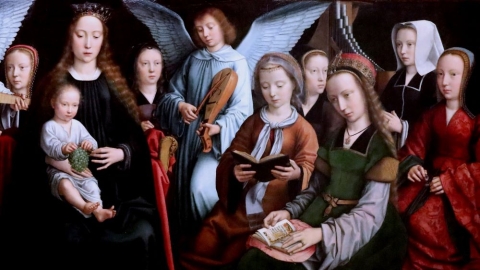Did the Mother of God Remain a Virgin During Childbirth?

Tradition distinguishes in Our Lady virginity before birth, during birth, and after the birth of Christ (ante partum, in partu, et post partum). The present question concerns the second aspect: virginity in partu. Did the birth of Jesus leave the Virgin’s flesh intact? That is, did the Mother of God give her Son to the world without breaking the virginal seal?
Church Fathers strongly assert this truth. “Do you want to know how He was born of a Virgin, and how His mother remained a virgin after the birth? Jesus entered while the door was closed.” This is a double reference to the resurrected Savior in the Cenacle, after his resurrection, “the doors were closed,” John 20:18 & 26. St. Hillary, Homily on St. John.
St. Bernard described it using a beautiful image: “The name of Mary, meaning the star of the sea, it is indeed with great justice that she is compared to a star, because just as the star emits rays from within without experiencing any alteration, so does the Virgin give birth to a son without damage to her virginity.” Second Homily on the Gospel of the Annunciation.
In fact, the liturgy states in the Preface of the Blessed Virgin: “who conceived Thine only-begotten Son by the overshadowing of the Holy Ghost, and the glory of her virginity still abiding, gave forth to the world the eternal Light, Jesus Christ our Lord.”
Pope St. Leo teaches it in his Tome to Flavian: “He was conceived of the Holy Ghost within the womb of His Virgin Mother, who brought Him forth without the loss of her virginity, even as she conceived Him without its loss.” Dz. 291.
The same pope explains this thought in his Letter (no. 35) to Julian, Bishop of Cos: “For although the Lord's nativity according to the flesh has certain characteristics wherein it transcends the ordinary beginnings of man's being, both because He alone was conceived and born without concupiscence (by the Holy Ghost) of a pure Virgin, and because He was so brought forth of His mother's womb that her fecundity bare Him without loss of virginity.”
It is thus de fide that the Mother of God is a virgin in partu.
There is a great suitability for this virginity in partu:
St. Thomas expounds this suitability in his Summa Theologiae (III, 28, 2):
-- First, because this was in keeping with a property of Him whose Birth is in question, for He is the Word of God. For the word is not only conceived in the mind without corruption, but also proceeds from the mind without corruption. Wherefore in order to show that body to be the body of the very Word of God, it was fitting that it should be born of a virgin incorrupt.
St. Thomas cites her the sermon from the Council of Ephesus: “Whosoever brings forth mere flesh, ceases to be a virgin. But since she gave birth to the Word made flesh, God safeguarded her virginity so as to manifest His Word, by which Word He thus manifested Himself: for neither does our word, when brought forth, corrupt the mind; nor does God, the substantial Word, deigning to be born, destroy virginity.”
-- It was not right that He who came to heal corruption, should by His advent violate integrity.
-- It was fitting that He Who commanded us to honor our father and mother should not in His birth lessen the honor due to His Mother.
The Fathers compare this miracle to that of the Resurrection and to His appearances in the Cenacle. Mary’s womb is compared to the east gate of the temple of Ezekiel, sealed once for all, because Yahweh passed through it; and to the stone of the tomb from which the Savior came out.
This is why the birth of Christ was done in joy, without any of the pain that normally accompanies birthing for women, since the sentence issued by God in the Garden of Eden, a sentence that does not affect Mary. Let us rejoice with her at the Nativity Crèche!
Related links
Illustration : Flickr / Jean Louis Mazieres (CC BY-NC-SA 2.0)





